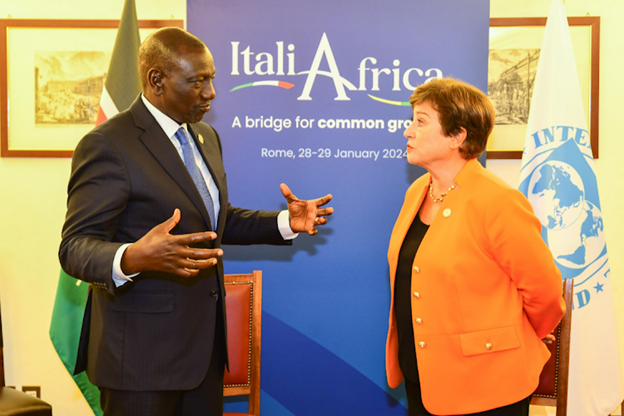President William Ruto delivered a solemn call to action at the Italy-Africa Summit in Rome, emphasizing the urgent need to accelerate reform measures within the Global Financial Architecture. In a measured address, he underscored that Africa’s pivotal aspiration to transform into a green industrial powerhouse rested heavily on the recalibration of this financial framework.
Addressing delegates on Monday, President Ruto reiterated a stark reality – African nations bear a disproportionate burden, paying five times more for their debt, driven by a complex interplay of real and perceived risk factors. His emphasis on the necessity for adjustments to debt treatment underscored the gravity of the economic challenges faced by the continent.
President Ruto, offering Kenya’s perspective, outlined a vision of transitioning away from fossil fuels and significantly increasing renewable energy sources by 2030. This, he argued, aligns with the global imperative to forge a climate-safe path. The President emphasized Africa’s commitment to raising its renewable capacity from 56 GW to at least 300 GW by 2030, a target set during the inaugural Africa Climate Summit in Nairobi in September 2023.
However, he poignantly highlighted the hurdles faced by Africa in securing appropriate capital, citing that out of the $3 trillion invested globally over the past two decades, a mere $60 billion reached the continent. President Ruto stressed that despite the potential of renewable energy to propel industrialization, Africa remained disadvantaged in accessing the necessary financial resources.
The President’s mention of the staggering statistic – approximately 600 million people in sub-Saharan Africa lack access to electricity – underscored the pressing need for reform. Additionally, he drew attention to the fact that 1 billion Africans still lack access to clean cooking facilities, emphasizing the urgency to reshape the energy landscape for improved living conditions.
While President Ruto acknowledged that Africa’s renewable capacity target might seem modest compared to the global goal, he argued that it could serve as a catalyst for creating a vibrant, self-sustaining economy. Such a transformation, he asserted, could inspire the youth to stay and contribute to their home countries, necessitating a commitment to a collaborative approach.
Inviting Italy to participate in Africa’s green initiatives, President Ruto proposed partnerships, highlighting initiatives such as the Africa Green Industrialization Initiative (AGII) and the Accelerated Partnership for Renewables in Africa. He extended an invitation for Italy to co-host an Investment Forum with the International Renewable Energy Agency (IRENA), providing an avenue for Italian companies and financial institutions to explore investment opportunities and shape a conducive policy environment.
President Ruto also urged sustained efforts to mature the ideas launched during COP28 in Dubai, emphasizing the critical role of reforms in Global Financial Architecture. As he called for Italy’s support in its capacity as the G7 Presidency, the President conveyed a serious and resolute commitment to advancing the shared goals of Africa and the global community.

